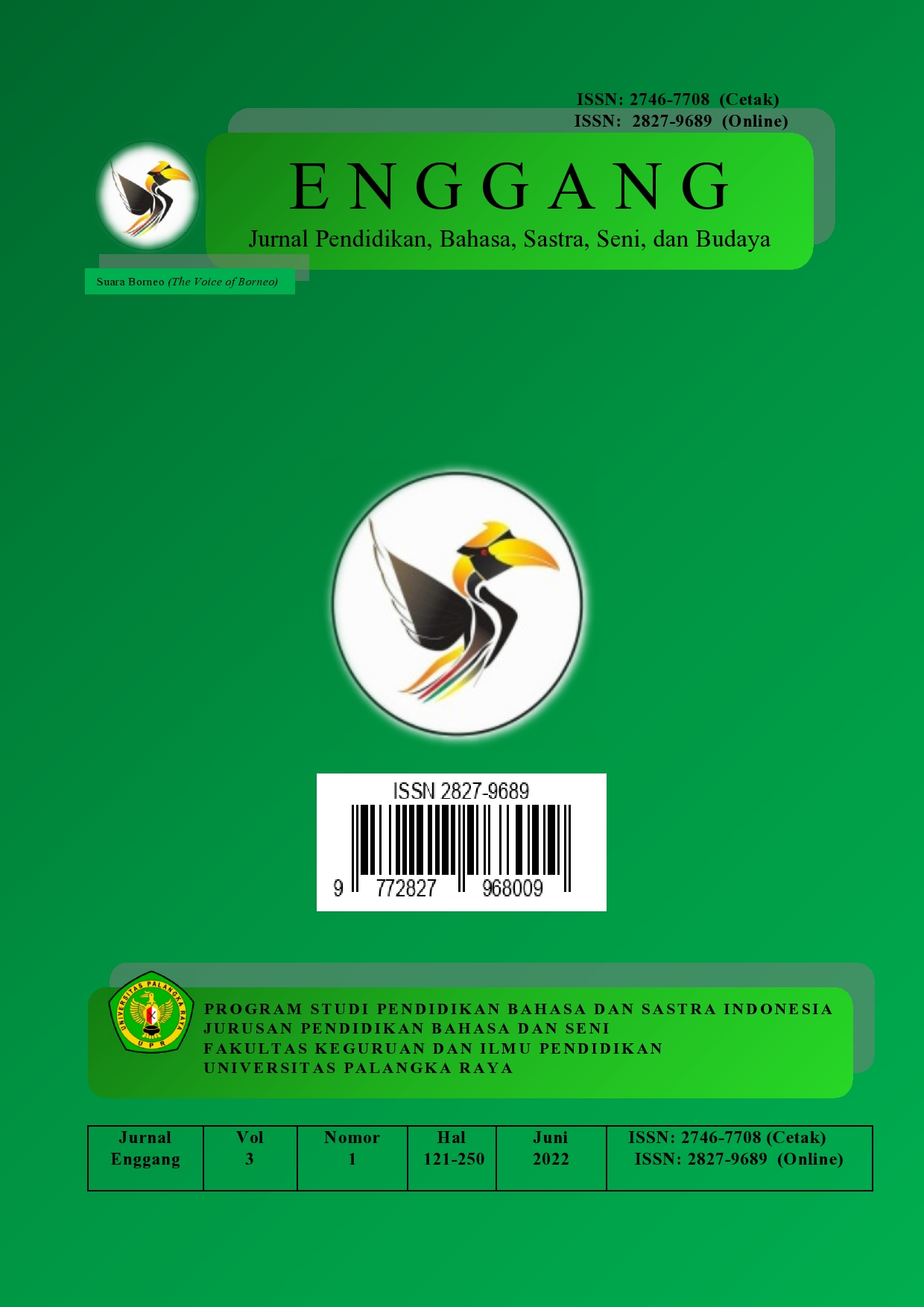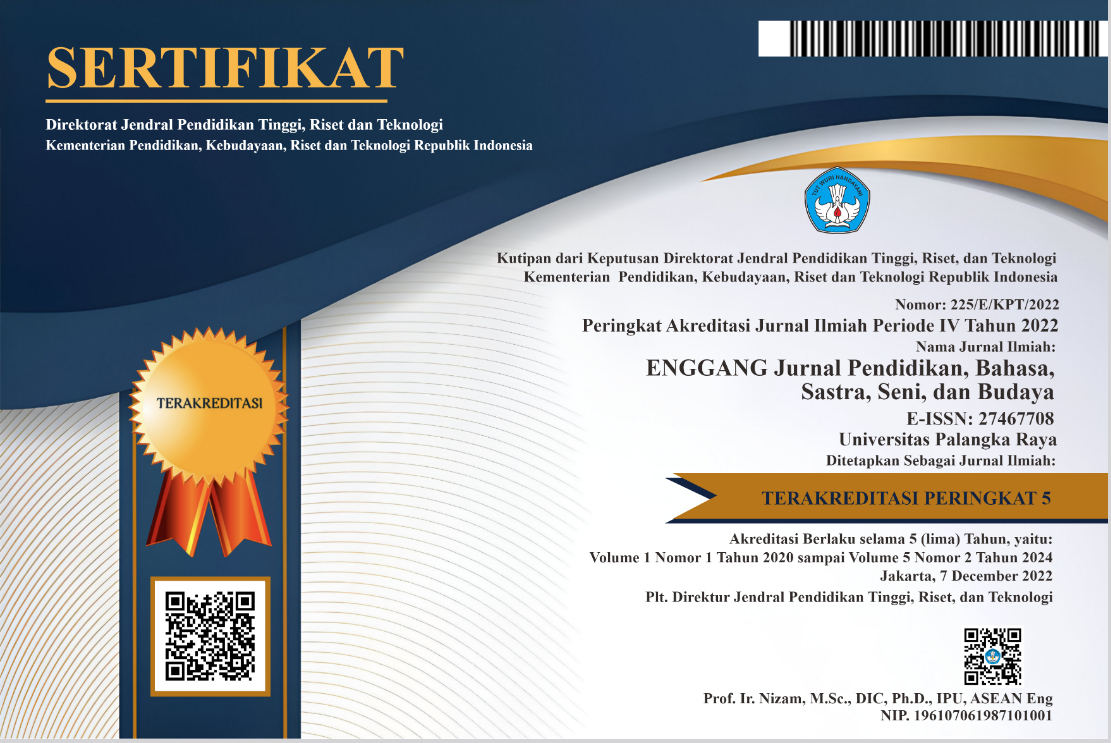Analisis Tradisi Wurumana Kematian Dalam Budaya Ende Lio Dan Dampaknya Pada Viability Ekonomi Masyarakat Desa Manulondo, Ndona Kabupaten Ende
DOI:
https://doi.org/10.37304/enggang.v5i2.14718Keywords:
Cultural Tradition, wurumana, economic viabilityAbstract
This research paper explores the tradition of “ Wurumana Kematian” in Manulondo village, Ndona sub-district, Ende district, Flores NTT. Wurumana is a customary tradition related to death, which also has a very deep cultural spiritual meaning and is passed down from generation to generation by the Ende Lio cultural community in general. This research discusses the wurumana tradition in Ende Lio vulture and its impact the economic viability of the community. Wurumana is a sharing tradition practiced by the Ende Lio community in important event such as marriage or wedding, circumcision, death and graduation. In this tradition. Various family parties are involved, including the ine ame, tuka bela aji ka’e and ana embu Wurumana also has a meaning of brotherhood that is prepared with the aim that, ehen another brother experiences grief due to death, then we as tuka bela and aji ka’e take part in the event. This study aims to understand how wurumana death is practiced, its role in the social life of the community and also the influence on the economic stability of the local community. Through a qualitative approach data was collected through in-depth interviews with traditional leaders (mosalaki: lio), as the main resource persons, participatory observation, and literature review. The result showed that the tradition of wurumana death is not only a ritual of respect for the deceased, but also a way to honor the dead.
Downloads
References
Astuti, I. I., & Lestari, S. N. (2022). Nilai-nilai dan Makna Simbolik Upacara Kirab 1 Syura di Loka Muksa Sri Aji Joyoboyo. ENGGANG: Jurnal Pendidikan, Bahasa, Sastra, Seni, dan Budaya, 3(1), 79-90.
Banunaek, A. R. (2018). Tradisi Wurumana dalam Budaya Ende Lio di Nusa Tenggara Timur. Jurnal Budaya Nusantara, 3(1), 45-54.
Barella, Y., Aminuyati, A., Saputri, M., Risti, O., Wahyuni, Y., Ayu, N., & Siska, S. (2023). Tradisi Suku Dayak Kanayatn Dalam Prosesi Kelahiran dan Kematian di Sungai Ambawang Kalimantan Barat. ENGGANG: Jurnal Pendidikan, Bahasa, Sastra, Seni, dan Budaya, 3(2), 451-461.
Chandra, L. C., Endi, Y., Randa, A. G., & Putra, G. B. (2022). Perkawinan Adat Dayak Kanayatn dan Hubungannya dengan Perkawinan Gereja Katolik. ENGGANG: Jurnal Pendidikan, Bahasa, Sastra, Seni, dan Budaya, 3(1), 122-250.
Deda, A. J., & Umbu, B. D. (2019). Makna simbolik dalam tradisi Wurumana pada masyarakat Ende Lio. Jurnal Antropologi Budaya, 5(2), 78-87.
Diman, P. (2020). Nyanyian Adat Masyarakat Dayak Maanyan: Suatu Pendekatan Hermeneutika. Enggang: Jurnal Pendidikan, Bahasa, Sastra, Seni, dan Budaya, 1(1), 40-56.
Kala, K. N., & Rato, D. (2020). Analisis dampak ekonomi tradisi Wurumana di Kabupaten Ende. Jurnal Ekonomi dan Bisnis, 7(1), 21-32.
Misnawati, M. (2022). Teori Ekopuitika untuk Penelitian Sastra Lisan. Drestanta Pelita Indonesia Press.
Narmada, A.A. (2012). Ritual kematian di Ende Lio: Sebuah kajian etnografis. Antropologi Indonesia, 33(1), 45-57.
Nggarang, J. P., & Leba, S. M. (2021). Tradisi Wurumana sebagai kearifan lokal masyarakat Ende Lio dalam menghormati leluhur. Jurnal Studi Budaya, 8(3), 112-121.
Poerwadi, P., & Misnawati, M. P. Deder dan Identitas Kultural Masyarakat Dayak Ngaju. GUEPEDIA.
Poerwadi, P., Misnawati, M., & Sari, F. M. (2023). Literary Phenomenology in Ngaju Dayak Folklore. Journal of World Science, 2(2), 261-277.
Purba, A. I. (2022). Peranan Marga Terhadap Kerukunan Beragama pada Masyarakat Kota Tanjung Balai Sumatera Utara. ENGGANG: Jurnal Pendidikan, Bahasa, Sastra, Seni, dan Budaya, 3(1), 45-56.
Usop, L. S. (2020). Peran Kearifan Lokal Masyarakat Dayak Ngaju untuk Melestarikan Pahewan (Hutan suci) di Kalimantan Tengah. ENGGANG: Jurnal Pendidikan, Bahasa, Sastra, Seni, dan Budaya, 1(1), 89-95.
Wari, R. T., & Rato, H. (2022). Upaya pelestarian tradisi Wurumana di Desa Manulondo Ndona dalam menghadapi perubahan zaman. Jurnal Sosial dan Budaya, 9(2), 65-75.
Widia, E., Poerwadi, P., Misnawati, M., Cuesdeyeni, P., & Linarto, L. (2023). Makna Simbolik Natas Banyang Pada Upacara Pernikahan Adat Dayak Maanyan di Barito Timur Dan Implikasinya Terhadap Pembelajaran Sastra di SMA. Bhinneka: Jurnal Bintang Pendidikan dan Bahasa, 1(4), 155-171.













